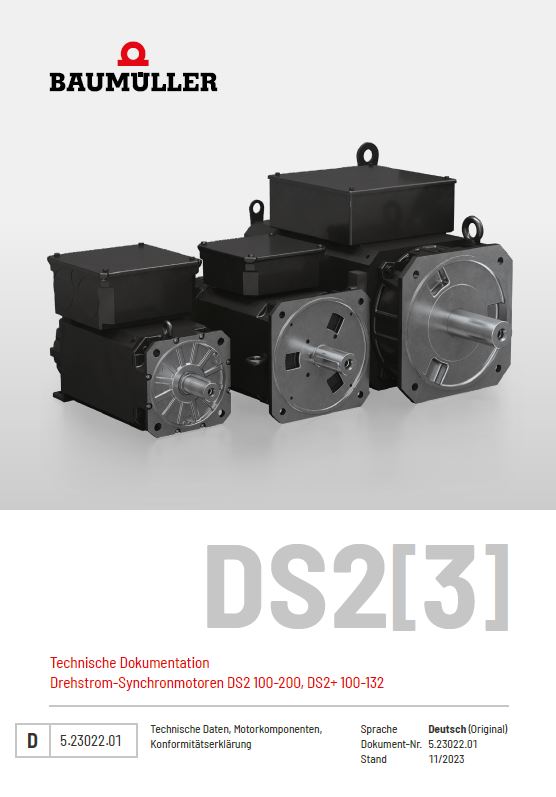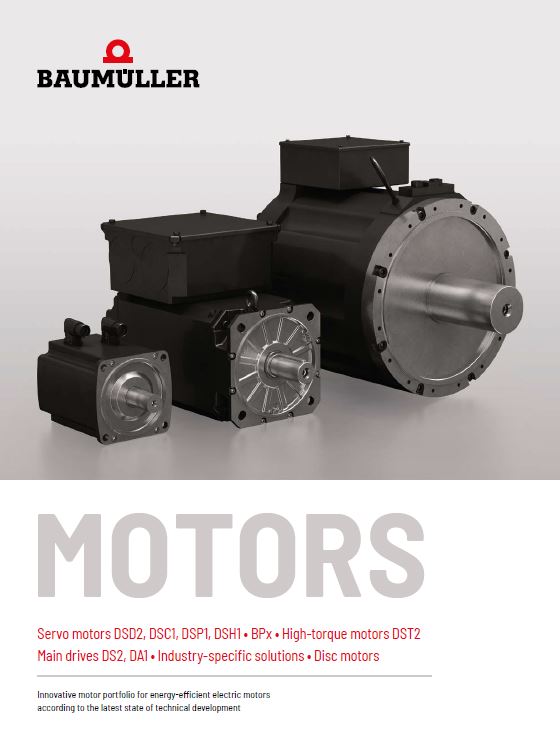Three-phase current synchronous motor DS2 – More power through coolness
The motor name for synchronous motors at Baumüller is DS. "DS" refers to the German for three-phase current synchronous motor ("Drehstrom-Synchronmotor").
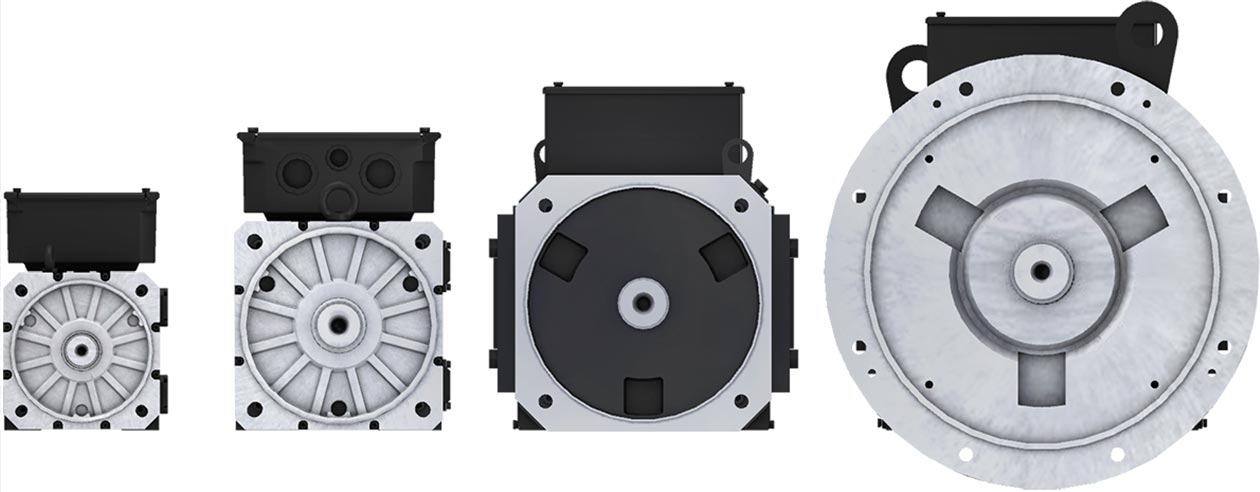
![]() The DS2 series is available in an air-cooled and a water-cooled version
The DS2 series is available in an air-cooled and a water-cooled version
Functional principle of a three-phase current synchronous motor
This is a permanently excited synchronous motor, as the magnets glued onto the rotor generate a permanent magnetic field (north and south poles).
If current is applied to windings U, V, and W in the stand (also referred to as the housing), this current generates a magnetic field around the windings. This magnetic field and the permanent magnetic field on the rotor cause an immediate attraction between the north and south poles and a repulsion of like poles. This in turn causes the rotary motion of the motor.
As a result of this motor structure, the rotating field frequency of the housing and the rotor always remains the same. This is therefore referred to as a synchronous rotating field frequency and the motor is therefore called a synchronous motor. In contrast, the frequency of the housing and the rotor of an asynchronous motor must never be identical. This is therefore referred to as an asynchronous rotating field frequency and the motor is therefore called an asynchronous motor.
Animation of a synchronous motor
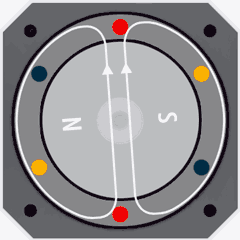 The animation shows a 3-phase winding system. For better clarity, the sketch shows a simple permanent magnet instead of a rotor. As soon as current flows into the windings, a rotating magnetic field is generated in the motor housing as described above. This also flows through the permanent magnets of the rotor, thereby causing a torque. The rotor executes a rotary motion and follows the rotation of the magnetic field.
The animation shows a 3-phase winding system. For better clarity, the sketch shows a simple permanent magnet instead of a rotor. As soon as current flows into the windings, a rotating magnetic field is generated in the motor housing as described above. This also flows through the permanent magnets of the rotor, thereby causing a torque. The rotor executes a rotary motion and follows the rotation of the magnetic field.
The torque is the greatest when the magnetic poles of the rotor form a right angle to the magnetic field of the housing. The position of the rotor is detected and transmitted to the actuator. This is required to shape the currents with an optimal angle of 90 degrees into the windings of the housing. This also allows the strength of the torque to be modified.
Resolvers or rotary encoders are used for position detection and simultaneously serve as an actual value for the position controller.
For applications with maximum energy efficiency requirements
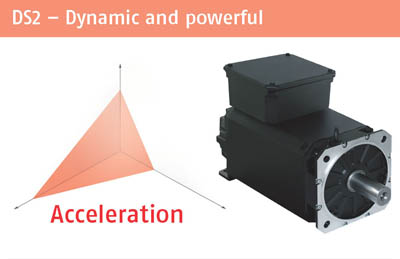 With an axis height of 100 to 200 mm, Baumüller offers synchronous motors with a wide variety of cooling methods. The servomotor is ideal for all applications with maximum requirements for energy efficiency, e.g. in:
With an axis height of 100 to 200 mm, Baumüller offers synchronous motors with a wide variety of cooling methods. The servomotor is ideal for all applications with maximum requirements for energy efficiency, e.g. in:
- Printing machines
- Packaging machines
- Textile machines
- Plastics machines
- Handling machines
- Special machines
- General mechanical engineering
High-performance synchronous main drives
 Thanks to an innovative water-cooling concept with improved heat transfer, Baumüller was able to improve the rated power of its DS2 motorsWith its DS2 series, Baumüller offers synchronous motors with up to 300 kW. Thanks to an innovative water-cooling concept with improved heat transfer, Baumüller was able to improve the rated power of its DS2 motors. As a result, manufacturers of plastic and forming machines in particular profit from the opportunity to cut down on added installation space. An additional advantage of water cooling is the reduction of noise by the water jacket, which renders noise damping measures unnecessary.
Thanks to an innovative water-cooling concept with improved heat transfer, Baumüller was able to improve the rated power of its DS2 motorsWith its DS2 series, Baumüller offers synchronous motors with up to 300 kW. Thanks to an innovative water-cooling concept with improved heat transfer, Baumüller was able to improve the rated power of its DS2 motors. As a result, manufacturers of plastic and forming machines in particular profit from the opportunity to cut down on added installation space. An additional advantage of water cooling is the reduction of noise by the water jacket, which renders noise damping measures unnecessary.
Baumüller DS2 servomotors were optimized even further for plastic and rubber applications as well as for printing, forming, and textile machines through speed increases and performance enhancements
If the on-site water quality is insufficient for cooling purposes, Baumüller offers motors with additional air cooling. With this version, which meets the requirements of the Asian market in particular, the Baumüller synchronous motors have a degree of protection up to IP54, just as in the water-cooled design.
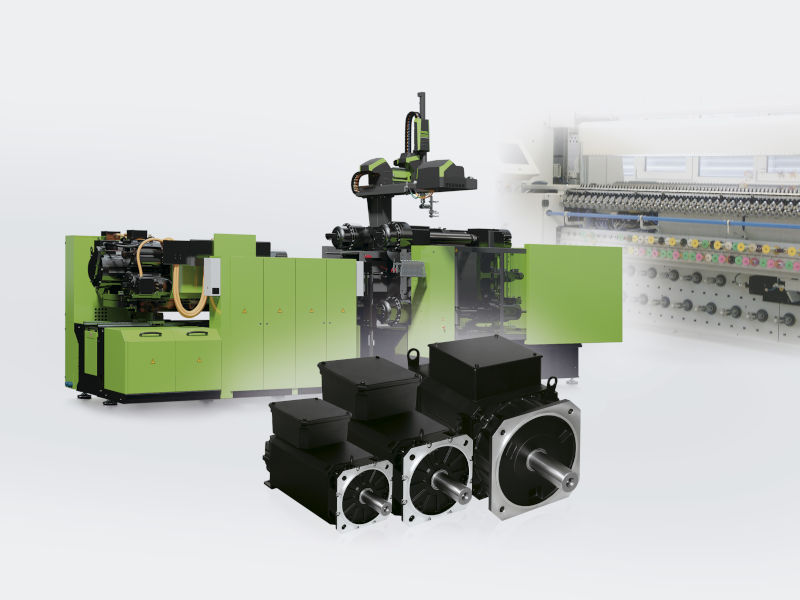 Baumüller DS2 servomotors were optimized even further for plastic and rubber applications as well as for printing, forming, and textile machines through speed increases and performance enhancementsIn addition to the cooling concept, Baumüller offers nominal speeds of up to 3,000 rpm. With respect to the use of DS2 motors in servo pumps, the Nuremberg manufacturer has thereby paved the way for new developments of internal gear pumps with increased speed. The use of motor/pump combinations with higher rotational speed makes it possible to reduce the size of both the pump and the motor. This allows an increase in both the economic efficiency and, due to the lower system inertia, the productivity of the machine.
Baumüller DS2 servomotors were optimized even further for plastic and rubber applications as well as for printing, forming, and textile machines through speed increases and performance enhancementsIn addition to the cooling concept, Baumüller offers nominal speeds of up to 3,000 rpm. With respect to the use of DS2 motors in servo pumps, the Nuremberg manufacturer has thereby paved the way for new developments of internal gear pumps with increased speed. The use of motor/pump combinations with higher rotational speed makes it possible to reduce the size of both the pump and the motor. This allows an increase in both the economic efficiency and, due to the lower system inertia, the productivity of the machine.
Thanks to the innovations in the cooling concept and the increase in speed, Baumüller's DS2 three-phase current synchronous motor generation offers a powerful, dynamic synchronous motor with up to 300 kW that gives the user productivity gains, cost savings, and thus a major competitive advantage.
Write us a message, our sales experts will be happy to advise you.
DS2 series three-phase current synchronous motors
DS2 series three-phase current synchronous motors are designed with a very high power density, a very high degree of efficiency and high dynamics and are therefore ideally suited for the most demanding applications in mechanical engineering. The motors are currently available in sizes 100, 132, 160, and 200. The robust and compact motors are also largely maintenance-free, which is another plus for economical operation.
Your advantages:
- Large power range
- Nominal speed of up to 4,500 rpm depending on the size
- High maximum torque for improved acceleration
- Shorter cycle times for increased productivity
- Elimination of couplings or pump supports thanks to internally toothed shaft
- Space and cost savings thanks to compact structure
- Very high power density
- Ultra-dynamic, robust, and compact three-phase current synchronous motors DS2
- Low noise emission
- High torque accuracy
- Wear-free and maintenance-free
- Good acceleration properties
- Very good concentricity properties
- High variability thanks to modular principle
- Energy-efficient due to high efficiency
- Permanently excited synchronous motors
- Ventilated IP23, IP54
- Water-cooled IP54
- Encoders: Resolver, SinCos encoder
- Optionally with a brake
Higher speeds for optimal operation
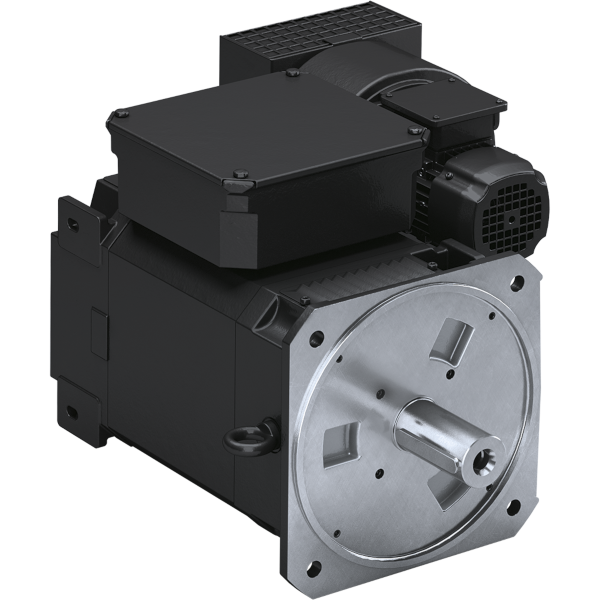 DS2-132 with air coolingWith their higher speeds, the DS2 motors are optimal for use as a servo pump drive in injection molding, rubber, and forming machines and as a main drive in printing and textile machines. Thanks to the increased nominal speed, the DS2 offers a maximum torque that is available over a broad speed control range, thereby improving the acceleration. This allows the realization of shorter cycle times and increased machine productivity. The increase in performance afforded by the increased speed results in optimal motor-transmission dimensioning and thus in improved economic efficiency.
DS2-132 with air coolingWith their higher speeds, the DS2 motors are optimal for use as a servo pump drive in injection molding, rubber, and forming machines and as a main drive in printing and textile machines. Thanks to the increased nominal speed, the DS2 offers a maximum torque that is available over a broad speed control range, thereby improving the acceleration. This allows the realization of shorter cycle times and increased machine productivity. The increase in performance afforded by the increased speed results in optimal motor-transmission dimensioning and thus in improved economic efficiency.
The optional internally toothed shaft is another improvement in the servo motors of the DSC, DSP, DSD2, and DS2 series. This interface version does not require any other costly transmission elements, such as couplings or pump supports. This cuts down on costs and optimizes the installation space. This is offered for DS2 motors in sizes 100 and 132 as an option / upon request.
The interface version with internal toothing dispenses with costly transmission elements such as couplings and pump supports. This option is available for servo motor series DS2, DSP, DSD2, and DSC and cuts down on costs while optimizing the installation space
Example application: The drive package for injection molding machines
Short cycle times, maximum precision, and energy-efficient drives. For hybrid and allelectric injection molding machines, we directly set the important industrial trends together with the machine manufacturer through jointly developed concepts. For this purpose, we draw on our extensive experience in your market segment.
Reduce cycle times and lower energy costs
- DC link system of individual drives optimized for peak load applications
- Compact synchronous motors with different cooling options, a broad speed control range, and high power and torque density
- Possible use of parallel functions (tool release and dosing procedure)
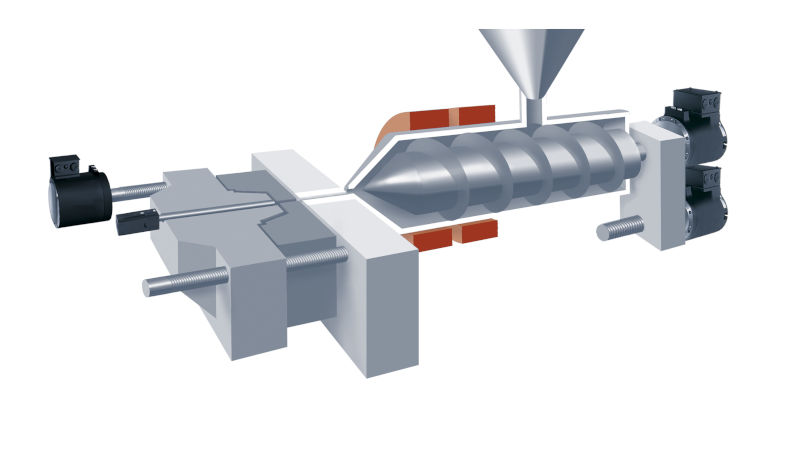
For increased precision and product quality
- Highly synchronous positioning thanks to the real-time-capable EtherCAT field bus
- Very short bus cycle times ensure optimal control and material thicknesses during the injection process
- Oversampling in the encoder signal evaluation for maximum positioning accuracy of asynchronous service data and standard Ethernet protocols
Increase machine availability
- Remote maintenance and diagnostics options thanks to EtherCAT field bus and TCP/IP tunneling
- Targeted diagnostics options and control loop analyses through the Fast Fourier Transformation and real-time oscilloscope functions integrated in the ProDrive parametrization software
- Gentle and controlled torque drop after braking to the speed of zero prevents the abrupt release of pretensioned screws, thereby preventing the destruction of screw heads
Technical data DS2
Subject to change. The specified values are maximum values.
Please refer to the technical documentation for details.
Write us a message, our sales experts will be happy to advise you.
